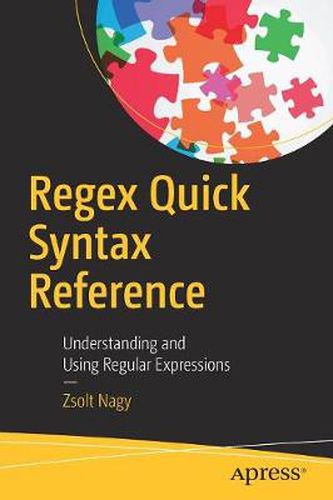Readings Newsletter
Become a Readings Member to make your shopping experience even easier.
Sign in or sign up for free!
You’re not far away from qualifying for FREE standard shipping within Australia
You’ve qualified for FREE standard shipping within Australia
The cart is loading…






This title is printed to order. This book may have been self-published. If so, we cannot guarantee the quality of the content. In the main most books will have gone through the editing process however some may not. We therefore suggest that you be aware of this before ordering this book. If in doubt check either the author or publisher’s details as we are unable to accept any returns unless they are faulty. Please contact us if you have any questions.
This quick guide to regular expressions is a condensed code and syntax reference for an important programming technique. It demonstrates regex syntax in a well-organized format that can be used as a handy reference, showing you how to execute regexes in many languages, including JavaScript, Python, Java, and C#. The Regex Quick Syntax Reference features short, focused code examples that show you how to use regular expressions to validate user input, split strings, parse input, and match patterns. Utilizing regular expressions to deal with search/replace and filtering data for backend coding is also covered.
You won’t find any bloated samples, drawn out history lessons, or witty stories in this book. What you will find is a language reference that is concise and highly accessible. The book is packed with useful information and is a must-have for any programmer. What You Will Learn
Formulate an expression
Work with arbitrary char classes, disjunctions, and operator precedence
Execute regular expressions and visualize using finite state machines
Deal with modifiers, including greedy and lazy loops
Handle substring extraction from regex using Perl 6 capture groups, capture substrings, and reuse substrings
Who This Book Is For If you have dealt with at least one programming language, chances are you know enough to understand regular expressions, and the examples in this book will help you develop proficiency.
$9.00 standard shipping within Australia
FREE standard shipping within Australia for orders over $100.00
Express & International shipping calculated at checkout
Stock availability can be subject to change without notice. We recommend calling the shop or contacting our online team to check availability of low stock items. Please see our Shopping Online page for more details.
This title is printed to order. This book may have been self-published. If so, we cannot guarantee the quality of the content. In the main most books will have gone through the editing process however some may not. We therefore suggest that you be aware of this before ordering this book. If in doubt check either the author or publisher’s details as we are unable to accept any returns unless they are faulty. Please contact us if you have any questions.
This quick guide to regular expressions is a condensed code and syntax reference for an important programming technique. It demonstrates regex syntax in a well-organized format that can be used as a handy reference, showing you how to execute regexes in many languages, including JavaScript, Python, Java, and C#. The Regex Quick Syntax Reference features short, focused code examples that show you how to use regular expressions to validate user input, split strings, parse input, and match patterns. Utilizing regular expressions to deal with search/replace and filtering data for backend coding is also covered.
You won’t find any bloated samples, drawn out history lessons, or witty stories in this book. What you will find is a language reference that is concise and highly accessible. The book is packed with useful information and is a must-have for any programmer. What You Will Learn
Formulate an expression
Work with arbitrary char classes, disjunctions, and operator precedence
Execute regular expressions and visualize using finite state machines
Deal with modifiers, including greedy and lazy loops
Handle substring extraction from regex using Perl 6 capture groups, capture substrings, and reuse substrings
Who This Book Is For If you have dealt with at least one programming language, chances are you know enough to understand regular expressions, and the examples in this book will help you develop proficiency.